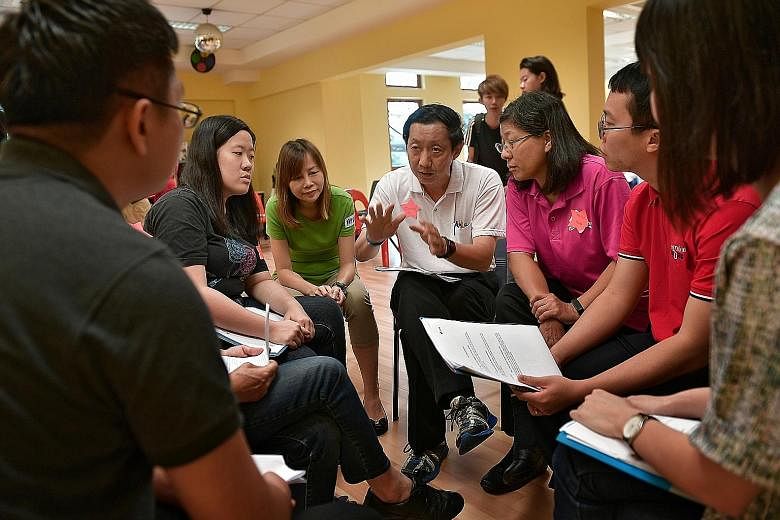It is a regular weekend at home for Mr and Mrs Lin, until an explosion at a block rocks their estate.
Panicking, they try to contact their son Harry, who occasionally skateboards near the block with his friends. But Harry does not answer his phone.
This scenario was one of several posed to grassroots leaders from Ang Mo Kio GRC during their first training session in psychological first aid on March 12.
"They will be the first responders when a terror attack happens in an estate, said Dr Majeed Khader, 50, chief psychologist at the Ministry of Home Affairs.
During the five-hour course, professional psychologists from the newly formed Human Emergency Assistance and Response Teams (Heart) taught the volunteers how to stabilise situations after a crisis hits, approach the affected people and identify signs of distress.
In small groups, they also role-played different scenarios after a terror attack, and discussed ways to minimise its impact.
In the case of the Lins, where the situation is likely to be chaotic, community responders trained in psychological first aid can move in to assure the family that help is at hand.
Senior psychologist Andrew Neo, 36, who helped to train the Ang Mo Kio group, said: "You want to acknowledge their anxiety and point them to the right avenues for help. But you should not over-promise or exaggerate what you can do, for instance, promising them that their son will be fine."
The training comes under the national SGSecure movement, which aims to prepare Singaporeans to deal with a terrorist attack.
The group of 60 community leaders is among the first batch of volunteers to receive training in psychological first aid.
In time, responders from all 89 constituencies will be trained.
Dr Majeed, who leads the Heart initiative, said community leaders will be taught to practise the "3Ls" - look, link and listen.
This means looking out for people who are affected by the crisis, who may or may not display symptoms; listening to what people are saying; and linking them to professional agencies that can offer more support.
The volunteers also have to be aware of the various religious and cultural differences, especially in bereavement practices, he added.
Lawyer Sathinathan, a long-time grassroots leader who attended the training, said the feeling of uneasiness can spread quickly within a community. "And with social media, misinformation can spread very quickly. Our role is to be there, calm the affected residents, and lead them to proper channels of information," said Mr Sathinathan, who goes by one name.
Business analyst and grassroots leader Ang Kim Long, 36, said community responders also have to think about the best way to reach out to the affected people.
"Some people might be very guarded after something bad has just happened to them. It might be useful to reach out to them through their neighbours, or someone they are familiar with in the community," he said.


